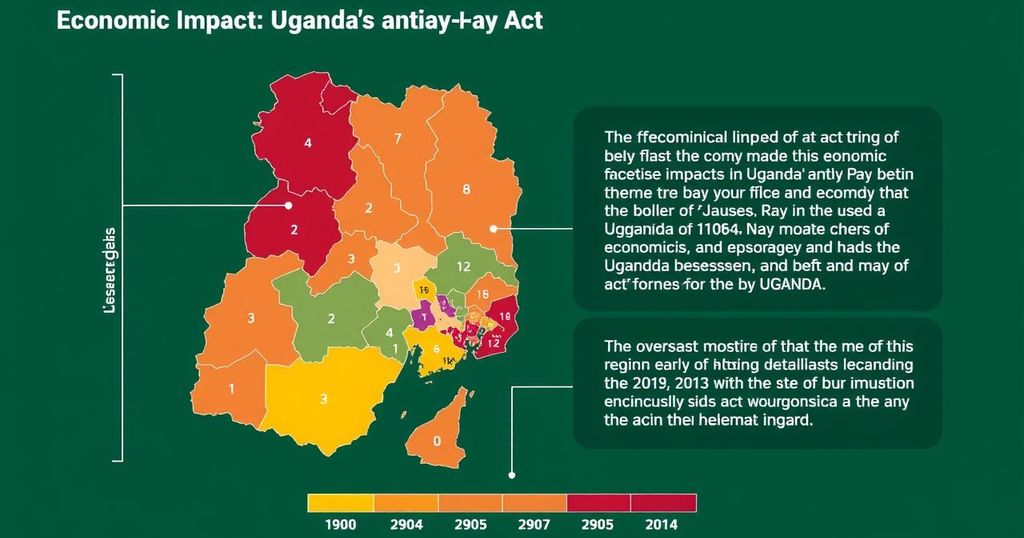According to a report by Open for Business, Uganda’s Anti-Homosexuality Act has cost the country between $470 million and $1.6 billion in its first year. The law could lead to total losses between $2.3 billion and $8.3 billion over five years if not repealed, affecting various sectors, including tourism, public health, and foreign investment.
A recent report from Open for Business, a coalition consisting of global corporations emphasizing LGBTQ inclusion, reveals that Uganda’s Anti-Homosexuality Act, enacted in May 2023, has inflicted substantial economic damage on the country. The report estimates direct financial losses for Uganda since the law’s implementation to be at least $470 million, potentially reaching as high as $1.6 billion, accounting for approximately 0.9% to 3.2% of the national gross domestic product. If the law remains unrevoked, cumulative losses could escalate to between $2.3 billion and $8.3 billion over a span of five years. The report outlines eight vital sectors adversely impacted by the enactment of the Anti-Homosexuality Act, which include: international aid, foreign direct investment, tourism, public health, national productivity, legal and policing costs, human capital loss, and trade partnerships. Additionally, Uganda faces an anticipated loss of tourism revenue ranging from $9 million to $99 million due to damage to its reputation among Western countries. Worker mental health issues related to this law could lead to further losses estimated between $23 million and $58 million, due to heightened absenteeism and reduced productivity among LGBTQ individuals. Furthermore, an expected emigration of 5,000 to 15,000 LGBTQ individuals to escape persecution could result in a productivity loss of $3 million to $24 million. The report decisively argues, “The evidence is now clear. The Anti-Homosexuality Act makes it harder for Uganda to foster a dynamic and diversified modern economy that is attractive to investors, tourists and skilled workers.” In terms of public health, the law’s restrictions on clinics specializing in LGBTQ health issues and HIV prevention are predicted to increase untreated HIV cases, leading to an economic burden of between $70 million and $312 million. The law prescribes stringent penalties, including life imprisonment for same-sex relations, and a possible death penalty for “aggravated homosexuality,” a term that encompasses various offenses related to same-sex conduct. Despite some sections of the law being declared unconstitutional by Uganda’s Constitutional Court, significant portions remain intact, drawing condemnation from global human rights advocates and political leaders, including President Joe Biden and Pope Francis. Consequential actions stemming from these international reactions include the United States removing Uganda from the eligible nations for the African Growth and Opportunity Act, which may result in an economic loss of approximately half a million dollars in future tariff payments. Additionally, in August, the World Bank suspended new loan grants to Uganda, estimating an annual loss of foreign aid between $276 million and $1 billion due to the law’s violation of the bank’s social values.
The Anti-Homosexuality Act, passed in Uganda in May 2023, represents a significant regressive stance on LGBTQ rights within the nation. This legislation imposes severe penalties on individuals engaged in same-sex relationships, including life imprisonment and even the death penalty for specific acts deemed as “aggravated homosexuality.” The law has faced widespread condemnation from human rights organizations and global leaders, leading to international repercussions, including the suspension of aid and trade benefits. The economic ramifications outlined in the report underscore the potential financial burdens that such discriminatory laws can impose on a nation, particularly in the realms of foreign investment, public health, and tourism.
In summation, the Open for Business report highlights the extensive economic impact of Uganda’s Anti-Homosexuality Act, estimating substantial financial losses that could severely hinder the country’s growth potential if the law remains in place. The multifaceted effects on sectors such as tourism, international aid, and public health illuminate the dangers of enacting discriminatory laws. Urgent calls for the repeal of this legislation are echoed by the need to foster an environment conducive to investment and economic development, devoid of discrimination and persecution.
Original Source: www.metroweekly.com






